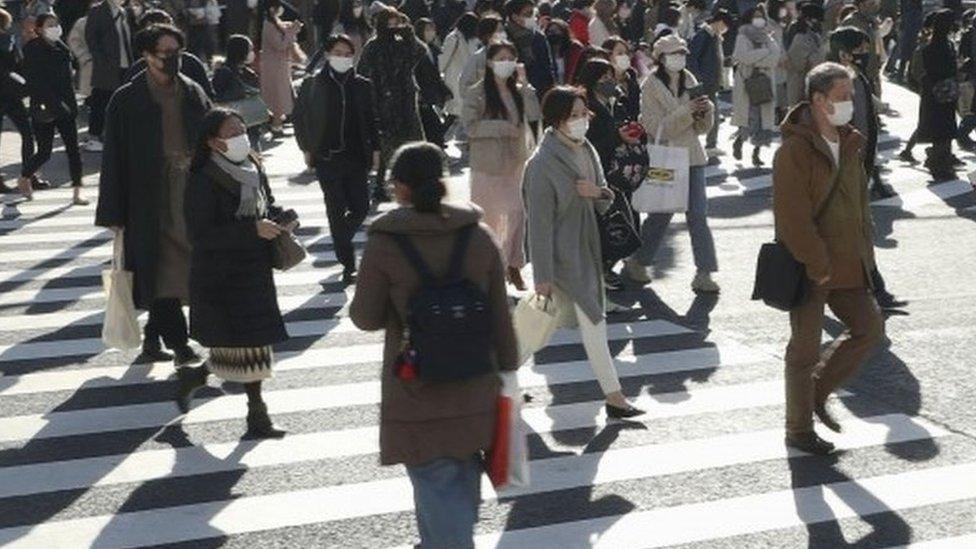Coronavirus: Cases of new variant appear worldwide
- Published
The Pfizer vaccine must be stored in ultra-low temperatures
Cases of the more contagious variant of Covid-19 first identified in the UK have been confirmed in several European countries as well as Canada and Japan.
Infections linked to people who arrived from the UK were reported in Spain, Switzerland, Sweden and France.
A couple found infected in Ontario, Canada, had no known travel history or high-risk contacts, officials say.
Japan is to ban most non-resident foreign nationals from entering the country for a month from Monday.

People in Tokyo on Saturday
Since reporting infections in five passengers who had all arrived from the UK, the country has confirmed two more cases, one of which is said to have been domestically transmitted.
News of the new variant triggered travel restrictions around the world last week.
Meanwhile, several EU countries have started to vaccinate people against the virus ahead of a co-ordinated rollout across the whole bloc on Sunday.
Health workers in north-east Germany said they were not prepared to wait another day to distribute the newly approved Pfizer-BioNTech vaccine. They began by immunising elderly residents of a nursing home in Halberstadt.
In Hungary, the state news agency said the first recipient of the vaccine was a doctor at Del-Pest Central Hospital. The authorities in Slovakia also said they had begun vaccinating.
The head of the European Commission, Ursula von der Leyen, has released a video on Twitter celebrating the vaccine rollout, calling it a "touching moment of unity., external
Scientists say the new variant of Covid-19 may have been spotted in the UK first because of the strength of the country's surveillance system.
The new variant is considerably more transmissible than previous strains but not necessarily any more dangerous for those infected, experts say.
How far has the new variant spread?
Those infected in Canada are a couple from Durham, near Toronto, who are now self-isolating.
In Japan, the two new cases are a pilot in his 30s who returned to Japan from London on 16 December and a woman in her 20s, external, one of his family members with no history of visiting the country, Kyodo News reports.
Under the travel suspension coming in on Monday, external, Japanese nationals and non-Japanese residents who are abroad will be allowed to return, and some travellers such as businesspeople will be allowed to enter from a small number of mainly Asian countries, external.
In Spain, four cases of the new variant were confirmed in Madrid. None of the patients, all of whom travelled from the UK, were seriously ill.
Switzerland identified three cases, two of which are known to be British citizens currently in the country. Switzerland is alone in Europe in keeping its ski slopes open to tourism over the Christmas and New Year period, and thousands of tourists from Britain have arrived in the last couple of weeks.
In Sweden, the health agency said a traveller there was ill with the strain but had been self-isolating since he returned from the UK.
What a pandemic Christmas looked like around the world
France confirmed its first case of the new variant - a French citizen in the central town of Tours who had arrived from London on 19 December, the health ministry said.
The man, who had been living in the UK, was asymptomatic and currently self-isolating at home, the ministry said.
France closed its border with the UK after the new variant was confirmed in Britain but ended its ban for EU citizens on Wednesday, providing people tested negative before travelling.
Thousands of lorry drivers spent Christmas Day in their cabs in Kent waiting to cross the English Channel.
Cases in Denmark, Germany, Italy, the Netherlands and Australia were reported earlier.
What is the new variant?
The new variant first detected in southern England in September is blamed for sharp rises in levels of positive tests in recent weeks in London, south-east England and the east of England
About two-thirds of people testing positive in these areas could have the new variant - but this is only an estimate, the Office for National Statistics (ONS) says.
Covid symptoms: What are they and how long should I self-isolate for?
Three things are coming together that mean the new variant is attracting attention:
It is rapidly replacing other versions of the virus
It has mutations that affect part of the virus likely to be important
Some of those mutations have already been shown in the lab to increase the ability of the virus to infect cells
All of these build a case for a virus that can spread more easily, says the BBC's health and science correspondent, James Gallagher.
Experts say the leading vaccines developed in recent months should still work.


LATEST GLOBAL SPREAD: Where has been hit hardest?
VACCINE SAFETY: Will pregnant women receive the Covid-19 vaccine?
REALITY CHECK: A vaccine will not alter your DNA

Related topics
- Published26 December 2020
